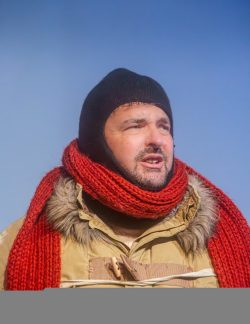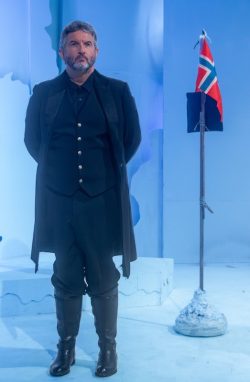 SCOTT of the Antarctic was a Great British Hero for generations throughout the 20th century. Indeed he was the paradigm of the English hero – courageous, honourable, thoroughly decent … and he failed bravely. And Captain Oates, one of Scott’s five-man team on that doomed journey to the South Pole, acquired legendary status with his decision to go out into the blizzard. “I may be gone some time,” were his famous last words.
SCOTT of the Antarctic was a Great British Hero for generations throughout the 20th century. Indeed he was the paradigm of the English hero – courageous, honourable, thoroughly decent … and he failed bravely. And Captain Oates, one of Scott’s five-man team on that doomed journey to the South Pole, acquired legendary status with his decision to go out into the blizzard. “I may be gone some time,” were his famous last words.
So we know the story and we know how it ends. No spoilers. But in the skilled hands of Ted Tally (perhaps best known as the Academy Award-winning adapter of The Silence of the Lambs) this is a real thriller, a drama in which two men – the British naval officer Robert Falcon Scott and the Norwegian explorer Roald Amundsen – compete in the desperate 1911 race to be first to the South Pole.
Amundsen – who died on a rescue mission over the Arctic in 1928, and whose body was never found –is portrayed as a pragmatist, a man who plans meticulously, with teams of dogs to pull the heavy sledges … and provide fresh protein as needed for the humans and the other dogs.
Scott is a thoroughly decent Englishman who plays by the (unwritten) rules, who is determined that his human team of hardened soldiers and sailors will achieve the objective on foot, pulling their own sledges, without what he sees as the cruel use of dogs. (Whether speculation about the Edwardian passion for hunting and shooting might suggest this is a somewhat ambivalent, even hypocritical, attitude is up to the audience).
 Amundsen (a beautifully measured performance by Pete Fernandez) becomes Scott’s inner voice, urging the sensible against the romantic and honourable – leave the frost-bitten and severely crippled Evans (movingly portrayed by Adrian Harding) to his inevitable death, he advises. Scott will none of it – they will, if necessary, although weak themselves, carry the dying man on the sledge rather than abandon him.
Amundsen (a beautifully measured performance by Pete Fernandez) becomes Scott’s inner voice, urging the sensible against the romantic and honourable – leave the frost-bitten and severely crippled Evans (movingly portrayed by Adrian Harding) to his inevitable death, he advises. Scott will none of it – they will, if necessary, although weak themselves, carry the dying man on the sledge rather than abandon him.
Scott (William O’Neill, capturing the complexity of a man who is by turns almost insanely brave, genuinely honourable and ultimately self-doubting) is in many ways a tormented figure. He believes, to his core, that he has to lead the team to be first to reach the South Pole, but his earlier nearly-there expedition hovers in his mind as a failure that has to be expunged. He loves his charismatic, spirited and independent wife Kathleen (a feisty performance by Lesley Baker-Evans), and his baby son Peter (in adult life of Slimbridge fame) but he fears he is an inadequate husband and a bad father.
This play, directed with conviction, real thought and great vision by Brian Williams, is not only a fascinating exploration of the Scott expedition and all five of its members, but also a powerful examination of the concept of patriotism and ideas of courage and heroism. At the Swan this week, it gains much of its extraordinary atmosphere from the brilliant set, designed by Annetta Broughton.
 We can easily see the straightforward courage and loyalty of the humane and sturdy Dr Wilson (Tyrone Trower) and the always-read-with-a-joke, Jack-the-Lad soldier Henry “Birdie” Bowers (Shaun Driver, who even gets a chance to show his great talent as a singer). The sheer endurance of Titus Oates (Dave King) and Adrian Harding’s Edgar “Taff” Evans are harrowing.
We can easily see the straightforward courage and loyalty of the humane and sturdy Dr Wilson (Tyrone Trower) and the always-read-with-a-joke, Jack-the-Lad soldier Henry “Birdie” Bowers (Shaun Driver, who even gets a chance to show his great talent as a singer). The sheer endurance of Titus Oates (Dave King) and Adrian Harding’s Edgar “Taff” Evans are harrowing.
Ultimately, the story revolves around Scott, and William O’Neill rises to the challenge … heroically.
FC